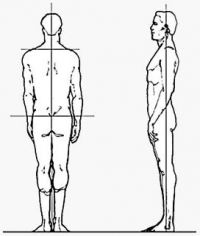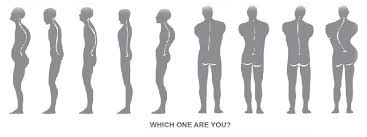Postural and Ergonomic Advice
As part of your physiotherapy assessment and treatment, a Chartered Physiotherapist will assess your posture and the impact it could be having on your symptoms. Posture plays an important role in all musculoskeletal conditions and can contribute towards the symptoms experienced and may even be the reason why your symptoms are not resolving.
At your first appointment with one of our physiotherapists at Lilliput Health, you will be assessed in a range of positions to see how you naturally hold yourself and to determine whether you are in relative alignment. This is done mainly in sitting and standing. The key areas we are interested in are your spinal alignment, the natural shape or curve of the spine, the shoulder girdle and the pelvic girdle.
The picture below demonstrates “optimal alignment”:

Image taken from: http://liftforlife.com/wp-content/bodybuilding-fitness-diet-health-articles/muscle-building/668-what-leads-to-joint-pain
We rarely see a client who presents with the perfect posture and typically we see a lot of variations. Different postures occur for many reasons; it could be hereditary, work-related, due to the presence of pain, as part of ageing and degenerative processes or due to a specific condition such as scoliosis. Below are examples of poor postures and mal-alignments:
Image taken from: http://nymassagealliance.org/event/postural-alignment-therapy-
It is important to address both standing and sitting posture as not only can it help create a better environment for your symptoms to settle but it can form part of the rehabilitation process to prevent future recurrence. Techniques our Chartered Physiotherapists commonly use to facilitate improved postures include:
• Management strategies such as taking regular breaks at work or during prolonged tasks
• A home exercise programme consisting of stretching and strengthening exercises aimed at correcting any muscle imbalance
• Hands on treatment to correct any muscular restriction or to mobilise stiff, hypomobile joints
• Taping to facilitate posture correction
Ergonomic Advice
In addition to the above methods our physiotherapists are able to provide appropriate advice on ways to adapt your work station and work practices to help prompt better postures. This can also include altering your car seat to specifically suit you, important if your day to day involves a lot of driving!
Ergonomics is a very important area to address as it promotes safe working practice, reducing the likelihood of developing an injury which ultimately leads to reduced sick days from work. Key areas for ergonomic improvement include:
• Office/work chairs
• Car seats
• Desk set up or workstation layout
• Use of current equipment or introducing equipment to facilitate better handling techniques and working practices (this can be anything from a different mouse mat to introducing use of sack trucks and trolleys.)
Keeping on top of posture and ergonomics at work can lead to the reduced risk of developing a problem. So even if you are pain free and not currently suffering from a problem, a postural assessment screen can help identify any potentially problematic areas. Many larger work providers have a designated HR or Occupational Health personnel who are trained to identify issues with work stations and it is a good idea to have a review with your workplace contact to maintain optimal working conditions. If you have any concerns you can always contact one of our Physiotherapy team at Lilliput Health to discuss your needs or if you are a current patient why not ask your practitioner on ways to improve your working environment. After all, a day spent hurting is a day not earning!
Contact our experienced team today on 01202 725090 or alternatively email on info@lilliputhealth.co.uk.
